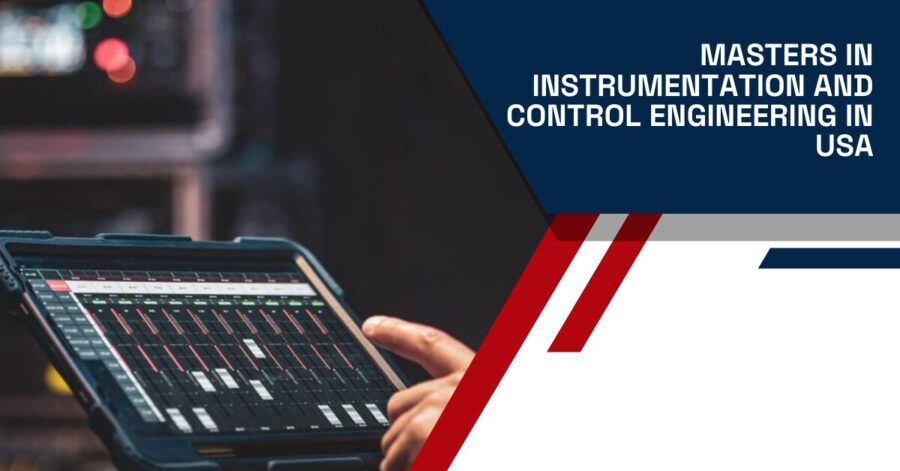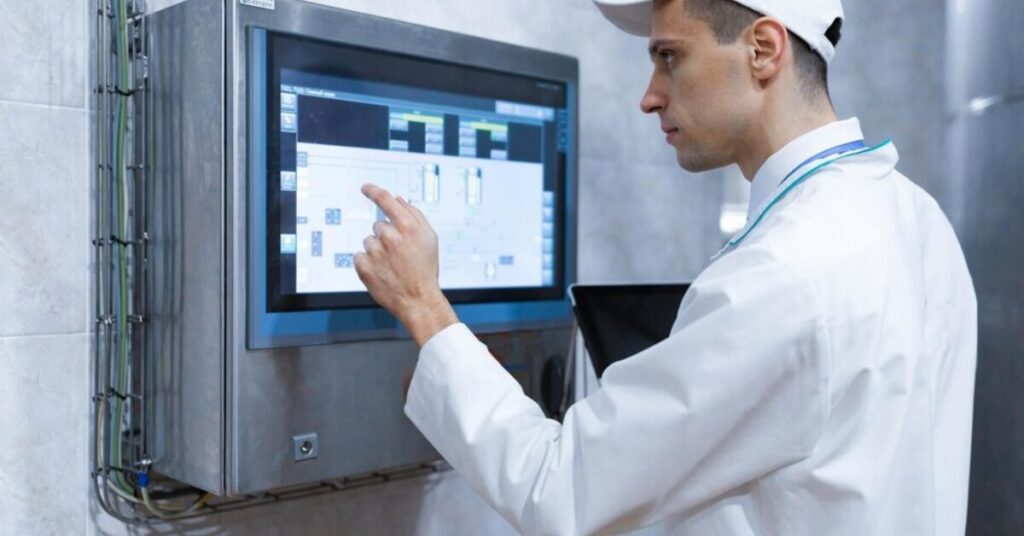12 September 2024
7 minutes read
Masters in Instrumentation and Control Engineering in USA

Key Takeaways
- The USA is a prime destination for a Master’s in Instrumentation and Control Engineering.
- The field offers specializations like automation and robotics.
- Graduates have varied career options across multiple industries.
Did you know that the demand for masters in Instrumentation and Control Engineering in USA is expected to grow by 8% over the next decade? This growth is driven by the increasing complexity of industrial processes and the need for precise control systems. However, many aspiring engineers face challenges in finding the right graduate program that offers both quality education and the flexibility to explore cutting-edge research.
Many students struggle with understanding the specific strengths of each program and how they align with industry needs. The financial burden of studying abroad can be a significant barrier. To address these concerns, it’s crucial to seek programs that not only offer a strong curriculum but also provide practical exposure and funding opportunities. This blog aims to shed light on some of the best U.S. universities for pursuing a master’s in this field, helping you make an informed decision for your future career.
Why Choose the USA for Your Master’s in Instrumentation and Control Engineering?

The United States is home to some of the world’s most prestigious universities and cutting-edge research facilities, making it a top destination for students seeking a Master’s in Instrumentation and Control Engineering. The country’s advanced educational infrastructure provides access to state-of-the-art technology, laboratories, and industry connections.
- Advanced Educational Infrastructure: The USA’s universities are equipped with modern labs, research centers, and resources necessary for in-depth study and innovation in instrumentation and control engineering.
- Diverse Specializations and Research Opportunities: Students have the chance to specialize in various sub-fields such as automation, robotics, process control, and more, with access to leading experts and groundbreaking research projects.
- Career Opportunities in the USA: Graduates often find ample job opportunities in diverse industries such as aerospace, automotive, energy, and pharmaceuticals. The USA’s industrial landscape offers a thriving environment for control engineers to apply their skills and knowledge.
Top Universities Offering Master’s in Instrumentation and Control Engineering in the USA
Several top-ranking universities in the USA offer specialized programs in instrumentation and control engineering. Each university has its unique strengths and focus areas, providing students with a variety of options to choose from.
Several top universities in the USA offer specialized programs in instrumentation and control engineering. Each university has its unique strengths, duration, innovative courses, and focus areas, providing students with a variety of options to choose from.
| University | Location | Program Focus | Fees (Approx.) |
|---|---|---|---|
| Massachusetts Institute of Technology (MIT) | Cambridge, MA | Control Systems, Automation | $53,790 per year |
| Stanford University | Stanford, CA | Robotics, Process Control | $57,861 per year |
| University of California, Berkeley | Berkeley, CA | Signal Processing, Control Systems | $26,544 per year (in-state), $41,396 per year (out-of-state) |
| Georgia Institute of Technology | Atlanta, GA | Systems & Controls, Automation | $14,064 per year (in-state), $29,140 per year (out-of-state) |
| University of Illinois at Urbana-Champaign | Urbana, IL | Robotics, Instrumentation | $17,210 per year (in-state), $34,210 per year (out-of-state) |
| California Institute of Technology (Caltech) | Pasadena, CA | Control Systems, Dynamics | $54,570 per year |
| University of Michigan, Ann Arbor | Ann Arbor, MI | Systems Engineering, Robotics | $26,336 per year (in-state), $51,130 per year (out-of-state) |
| University of Texas at Austin | Austin, TX | Automation, Instrumentation | $12,284 per year (in-state), $22,712 per year (out-of-state) |
| Carnegie Mellon University | Pittsburgh, PA | Robotics, Control Systems | $50,100 per year |
| Purdue University | West Lafayette, IN | Process Control, Instrumentation | $10,330 per year (in-state), $28,794 per year (out-of-state) |
| University of California, San Diego | San Diego, CA | Signal Processing, Control Systems | $13,634 per year (in-state), $28,736 per year (out-of-state) |
| University of Southern California (USC) | Los Angeles, CA | Control Systems, Robotics | $2,075 per unit |
| University of Florida | Gainesville, FL | Automation, Process Control | $10,770 per year (in-state), $27,335 per year (out-of-state) |
| University of Wisconsin-Madison | Madison, WI | Systems Engineering, Control Theory | $12,366 per year (in-state), $25,518 per year (out-of-state) |
| Texas A&M University | College Station, TX | Instrumentation, Process Control | $10,552 per year (in-state), $24,994 per year (out-of-state) |
Curriculum and Specializations
The curriculum for a Master’s in Instrumentation and Control Engineering in the USA is designed to provide a deep understanding of the principles and applications of this field.
- Core Curriculum:
- Fundamental courses in control systems theory, instrumentation design, and signal processing.
- Advanced mathematics and statistics for engineers.
- Principles of automation and robotics.
- Elective Courses:
- Specialized electives allow students to focus on areas like process control, embedded systems, or industrial automation.
- Options to explore emerging fields such as IoT (Internet of Things) applications in control engineering, artificial intelligence, and machine learning in control systems.
- Specializations:
- Robotics and Automation: Focus on the design and implementation of robotic systems and automated processes.
- Process Control: Emphasizes the management and optimization of industrial processes.
- Embedded Systems: Concentrates on integrating control systems within electronic hardware for various applications.
- Practical Training and Projects:
- Hands-on labs and workshops to apply theoretical knowledge to real-world problems.
- Capstone projects or thesis work, often involving industry collaboration or research, to develop practical solutions in instrumentation and control engineering.
- Research Opportunities:
- Opportunities to engage in cutting-edge research under the guidance of faculty experts.
- Research areas might include advanced control algorithms, sustainable energy systems, or biomedical instrumentation.
- Interdisciplinary Learning:
- Courses that intersect with other engineering disciplines like electrical, mechanical, and computer engineering.
- Collaboration with other departments or schools within the university for a holistic educational experience.
- Professional Development:
- Seminars, workshops, and guest lectures by industry professionals.
- Opportunities to attend conferences and present research findings.
- International Perspective:
- Some programs offer global immersion experiences or international collaboration projects.
- Exposure to global standards and practices in instrumentation and control engineering.
Admission Requirements and Process

Understanding the admission requirements and process for a Master’s in Instrumentation and Control Engineering is crucial for a successful application. This section outlines the key prerequisites, documents, and steps needed to navigate the application process at top U.S. universities, helping you prepare effectively and increase your chances of acceptance.
| Requirement | Description | Typical Criteria or Documentation Needed |
|---|---|---|
| Academic Qualifications | Bachelor’s degree in engineering or a related field. | Transcripts showing a strong academic record, typically a GPA of 3.0 or higher. |
| Standardized Test Scores | GRE scores are commonly required for admission. | Official GRE scores, with competitive quantitative and verbal scores. |
| Language Proficiency | TOEFL or IELTS scores for non-native English speakers. | Minimum TOEFL score of 80-100 or IELTS score of 6.5-7.0, depending on the university. |
| Statement of Purpose (SOP) | A personal essay outlining the applicant’s goals and reasons for applying. | Clearly defined academic and career objectives, and relevance of the program to these goals. |
| Letters of Recommendation | Recommendations from academic or professional references. | Letters from professors or employers attest to the applicant’s abilities and potential. |
| Resume/CV | A detailed summary of academic and professional experiences. | Educational background, research projects, internships, work experience, skills. |
| Application Forms | Specific forms and information are required by each university. | Completed application forms, often submitted online, with required fees. |
| Portfolio/Work Samples | Some programs may require samples of previous work or research. | Relevant project reports, publications, or other documentation of engineering work. |
| Interviews | Some universities conduct interviews as part of the admission process. | Personal or virtual interviews to assess the candidate’s fit for the program. |
Funding and Scholarship Opportunities
Pursuing a Master’s degree abroad can be financially challenging, but there are various funding and scholarship options available to help mitigate the costs.
| Scholarship/Funding Type | Description | Eligibility Criteria | Offered By/At | Coverage/Amount |
|---|---|---|---|---|
| University-Specific Scholarships | Merit-based or need-based scholarships are offered by universities. | Academic excellence, leadership qualities, financial need. | Individual universities (e.g., MIT, Stanford) | Varies (tuition waivers, partial to full coverage) |
| External Scholarships | Scholarships provided by organizations, foundations, or governments. | Varies (academic merit, specific research areas, nationality). | Organizations like Fulbright, Chevening | Varies (tuition, living expenses, travel) |
| Research Assistantships | Positions that involve assisting in research projects. | Academic merit, relvant research interests. | University departments | Stipend, tuition waivers |
| Teaching Assistantships | Positions involving teaching responsibilities. | Academic merit, teaching abilities. | University departments | Stipend, tuition waivers |
| Fellowships | Awards for outstanding students to support their studies. | Academic excellence, research potential. | Universities, research institutions | Stipend, tuition waivers, research funding |
| Industry Sponsored Scholarships | Scholarships sponsored by companies in relevant fields. | Interest in specific industries, internship potential. | Companies in engineering sectors | Varies (tuition, internships, mentorship) |
| Government Grants | Financial aid is offered by home or host country governments. | Nationality, academic merit, field of study. | Government agencies | Varies (tuition, living expenses) |
Career Prospects After Graduation
Graduates of Master’s programs in Instrumentation and Control Engineering in the USA have numerous career opportunities across various industries.
| Job Role | Industry Sector | Description | Average Salary Range (USD) |
|---|---|---|---|
| Control System Engineer | Manufacturing, Energy, Aerospace | Design and maintain systems for controlling and monitoring industrial processes. | $70,000 – $100,000 |
| Automation Engineer | Automotive, Manufacturing, Energy | Develop automated systems to enhance efficiency and safety in various industries. | $65,000 – $95,000 |
| Process Engineer | Chemical, Pharmaceutical, Oil & Gas | Optimize and improve industrial processes for increased productivity and reduced costs. | $75,000 – $105,000 |
| Instrumentation Engineer | Energy, Utilities, Research Labs | Design and implement instrumentation systems for measuring, controlling, and monitoring processes. | $68,000 – $98,000 |
| Project Manager | Various Industries | Oversee and manage engineering projects, ensuring they meet specifications, budgets, and timelines. | $80,000 – $120,000 |
| Research and Development Engineer | Technology, Healthcare, Energy | Innovate and develop new technologies and solutions in instrumentation and control engineering. | $75,000 – $110,000 |
| Systems Integrator | IT, Telecommunications, Defense | Integrate various systems and technologies to create efficient and effective control and automation solutions. | $70,000 – $100,000 |
| Quality Assurance Engineer | Manufacturing, Aerospace, Automotive | Ensure that products and systems meet quality standards and regulations. | $65,000 – $90,000 |
| Technical Sales Engineer | Technology, Engineering Firms | Provide technical support and expertise to assist in the sale of engineering products and solutions. | $60,000 – $85,000 |
| Consultant | Engineering Consulting Firms | Advise clients on instrumentation and control engineering solutions and strategies. | $75,000 – $120,000 |
Conclusion
Pursuing a Master’s in Instrumentation and Control Engineering in the USA offers a unique blend of advanced education, diverse specializations, and excellent career prospects.
This guide aims to provide prospective students with comprehensive information to make informed decisions about their education and careers in this dynamic and evolving field.
Step into the realm of elite professionals by joining Ambitio Pro. This premier platform is designed to elevate your career through advanced resources, expert guidance, and access to exclusive opportunities, setting you on a path to achieve unparalleled success in your field.
FAQs
What is Instrumentation and Control Engineering?
Instrumentation and Control Engineering is a branch of engineering that focuses on the design, development, and maintenance of systems used to monitor, control, and automate industrial processes. It combines principles from mechanical, electrical, and computer engineering to create systems that improve efficiency, safety, and productivity in various industries.
Why should I pursue a Master’s in Instrumentation and Control Engineering in the USA?
The USA is home to some of the world’s leading universities and research facilities in engineering. Pursuing a Master’s degree in the USA offers access to advanced educational resources, diverse specializations, and extensive research opportunities. Additionally, the USA provides a dynamic job market with numerous career opportunities in various industries for graduates.
What are the typical admission requirements for a Master’s program in Instrumentation and Control Engineering in the USA?
Typical admission requirements include a bachelor’s degree in engineering or a related field, a competitive GPA, GRE scores, and English language proficiency tests (TOEFL or IELTS) for non-native speakers. Applicants also need to submit a Statement of Purpose, Letters of Recommendation, and a Resume or CV.
What kind of job opportunities can I expect after completing my Master’s in Instrumentation and Control Engineering in the USA?
Graduates can pursue careers in industries such as manufacturing, automotive, energy, pharmaceuticals, and more. Common job roles include control system engineer, automation engineer, process engineer, instrumentation engineer, and project manager. The field offers competitive salaries and opportunities for advancement in various technical and managerial roles.
Are there scholarship and funding options available for international students pursuing a Master’s in Instrumentation and Control Engineering in the USA?
Yes, many universities in the USA offer scholarships, grants, and assistantships specifically for international students. These can include merit-based scholarships, need-based grants, teaching assistantships, and research assistantships, which can help cover tuition fees and living expenses. Additionally, various external organizations and foundations also offer scholarships and financial aid to international students.

You can study at top universities worldwide!
Get expert tips and tricks to get into top universities with a free expert session.
Book Your Free 30-Minute Session Now! Book a call now




























